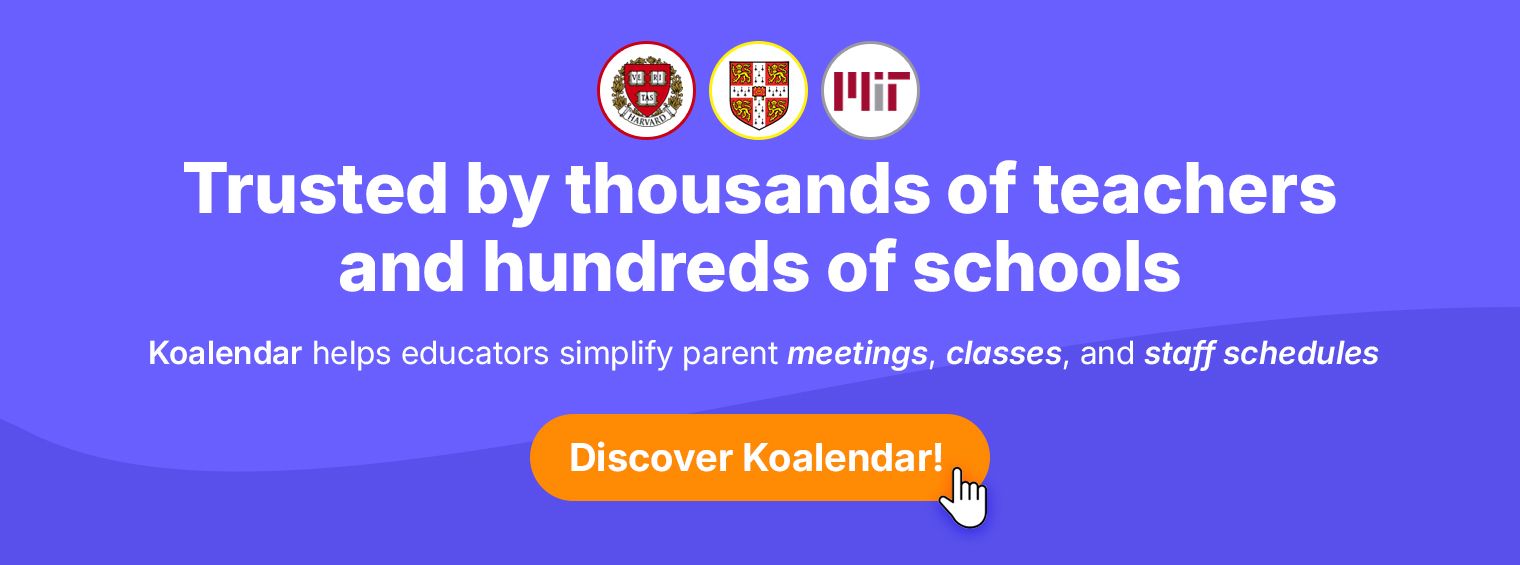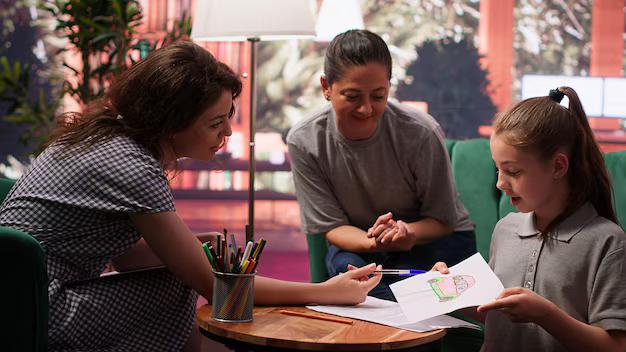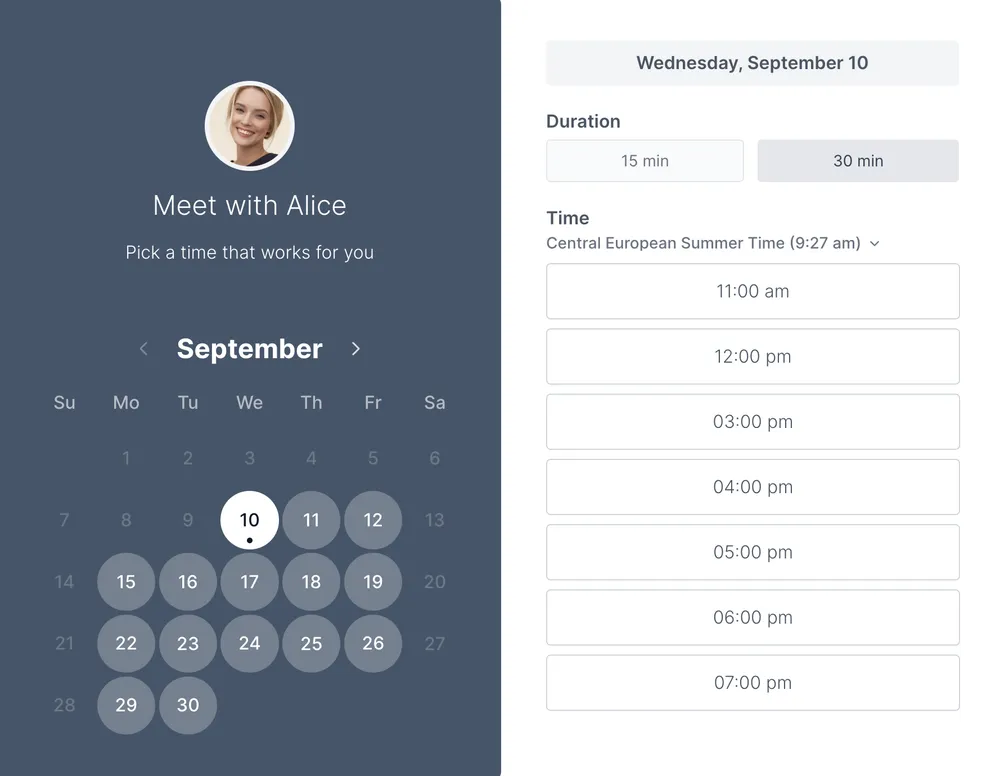Most teachers would agree that the real challenge of parent–teacher conferences isn’t just preparing feedback, it’s keeping everything organized. It should come as no surprise, as they are no easy task. They require coordinating schedules, preparing talking points, and making sure every family feels heard. Truth be told, the process can feel overwhelming. That’s where a parent-teacher conference form becomes your best ally.
Think of the form as your roadmap: it ensures nothing important slips through the cracks, gives parents a clear structure, and helps you stay focused. Pair it with a smart scheduling tool like Koalendar to schedule the conference, and you’ll save hours of back-and-forth emails while making the experience smoother for everyone. Let’s dive in and discover the 3 free parent-teacher conference form templates we’ve put together for you so you can download, print, and use them for free.
Benefits of parent conference forms for teachers you might not know
Did you know that a 2023 review by Munthe and Westergård on parent–teacher conferences revealed that these meetings work best when communication roles are clearly defined? Teachers often serve as experts, evaluators, and facilitators, while parents shift between roles like listeners, supporters, or even defenders of their child. Students, meanwhile, are usually observers or self-reporters. The study reveals that without structure, these roles can overlap and lead to tension. That’s exactly why parent conference forms for teachers are so valuable: they give each party a clear framework, ensure balanced dialogue, and help teachers guide conversations toward collaboration instead of conflict.
When done properly, parent and teacher conference forms will:
- Create a structure and streamline the parent meeting process so every meeting follows the same flow and nothing is forgotten
- Save teacher preparation time: teachers can easily prepare notes in advance, parents know what to expect, and conferences stay on track
- Encourage dialogue: parents have space to share questions or concerns, making the conference two-way instead of one-sided
- Document outcomes: both teacher and parent leave with a record of what was discussed and agreed upon
- Support follow-up: the clear goals and action steps you record will help measure progress between meetings
Simply put, forms turn conferences from a stressful obligation into a powerful tool for student success.

What should teachers say at a parent-teacher conference?
Before you start designing your form, you need to know what you will talk about. In fact, forms work best when they align with what you plan to discuss. We’ve already covered some useful strategies on how to communicate with parents as a teacher but at their core, conferences should focus on three areas:
- Academic progress: grades, reading levels, or subject mastery
- Behavior and social skills: classroom participation, friendships, emotional growth
- Next steps: strategies at home and in class to support learning
Parents often come in with questions like:
- “How is my child doing compared to their peers?”
- “What can I do at home to support them?”
- “Are there any concerns I should be aware of?”
If you prepare your answers in advance and document them in a conference agenda template, you’ll show professionalism and build trust.
Pro tip: End every conference on a positive note. Even if challenges exist, highlight the student’s strengths and share specific examples of progress.

How to create forms and templates for preschool, elementary, and middle school/high school
Your and your students’ needs vary greatly depending on the stage they are in, so a one-size-fits-all template won’t work. That’s why we’ve put together 3 free parent-teacher conference forms to help preschool, elementary, and middle school teachers get the most out of their parent-teacher conferences. Let’s take a look.
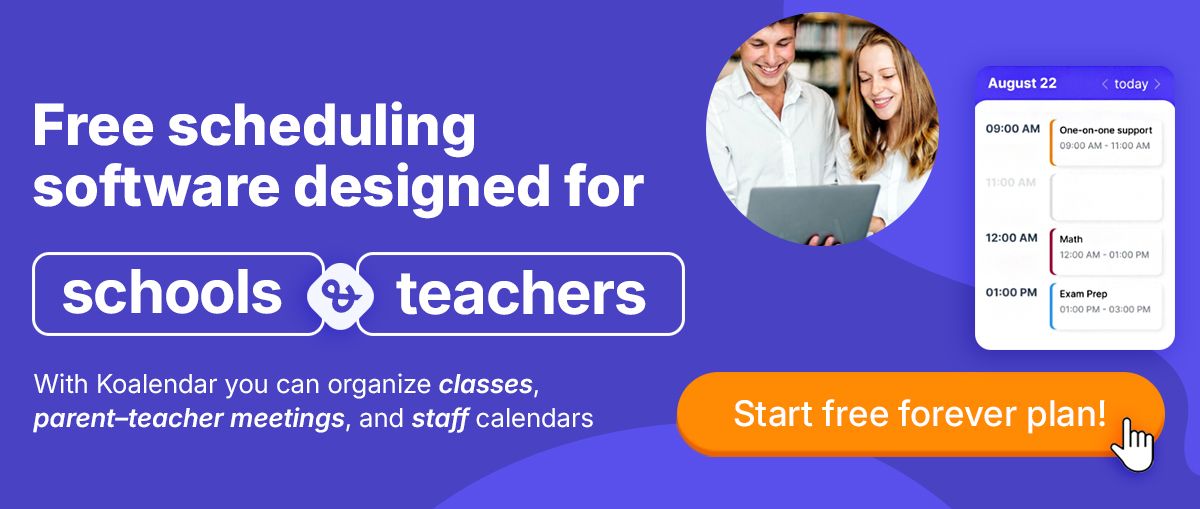
Preschool parent-teacher conference template
At this stage, your meeting is less about grades and more about developmental milestones. In preschool, parents are eager to understand how their child is adjusting socially, emotionally, and physically. Using a form helps you guide conversations beyond “cute stories” and ensures your students’ parents see the bigger picture of their child’s growth.
Example of a preschool parent-teacher conference template
Student name:
Class /Age Group:
Date:
Teacher:
Attendees:
| Questions | Notes/ Examples | |
| Cognitive / Pre-Academic Skills | What early literacy/math skills does the child show? | Counts to 10, names shapes |
| Motor skills | Fine/gross motor skills milestones | Holds crayon, climbs confidently |
| Daily routines | Independence in transitions and tasks | Needs reminders for clean-up |
| Strengths to celebrate | What is the child doing well? | Curiosity, friendships |
| Growth areas | What needs support? | Speech clarity, focus |
| Goals / Next steps | 2-3 goals for home + school | Practice colors, encourage sharing |
| Parent input | Questions or insights from home | |
| Action plan | Shared commitments | Teacher will… parent will... |
| Signatures | Parents Teacher |
Our preschool parent-teacher conference template highlights social-emotional learning, early language, motor skills, and independence. It creates a balanced space for celebrating strengths, identifying areas for growth, and setting small, achievable goals. To foster collaboration, we’ve included the parent input area so they are involved right from the start in their child’s education journey.
Download your preschool parent teacher conference form PDF
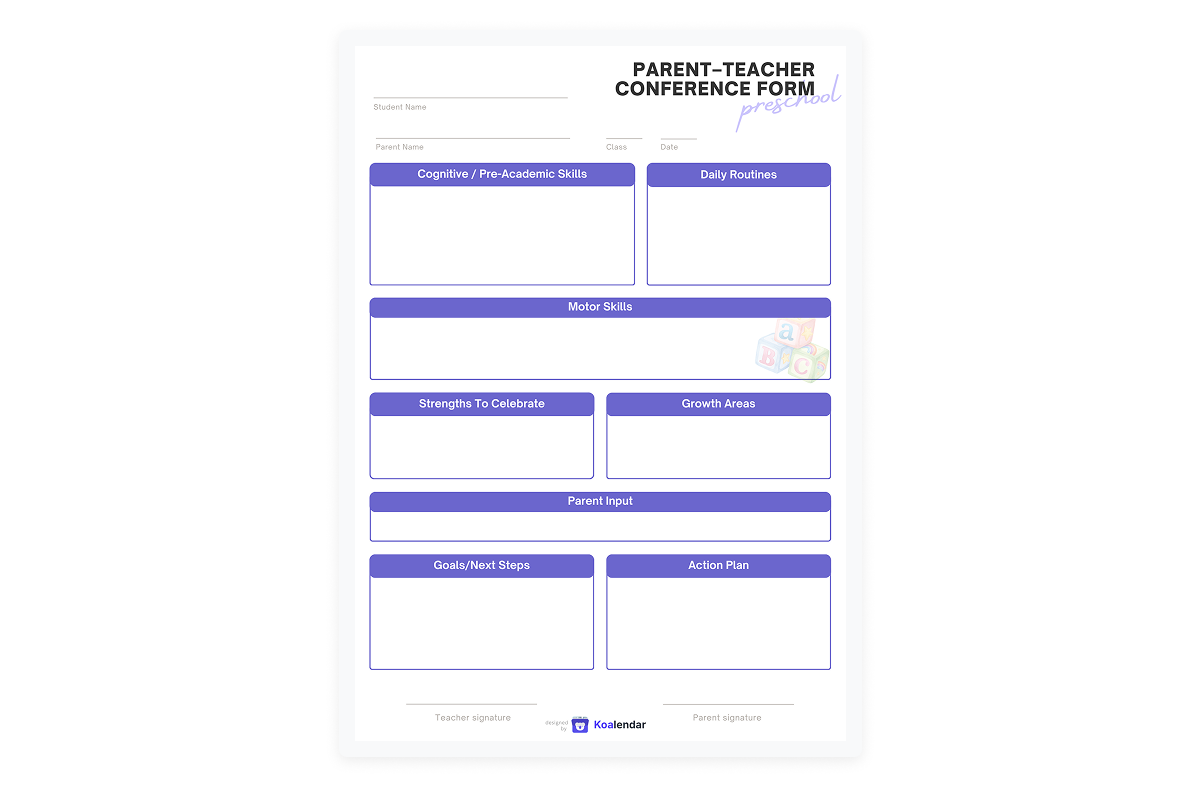
Elementary parent-teacher conference form
In elementary school, parents expect more academic insights alongside social development. Reading, writing, and math benchmarks become central, but parents also want to know how their child behaves in class and builds friendships. We’ve created a clear form that covers all essentials without overwhelming families with jargon.
Example of an Elementary parent conference form for teachers
Student name:
Grade/Teacher:
Date:
Attendees:
| Prompts | Notes/Data | |
| Academic Performance | Which subjects are strong/weak? | Report card, work samples |
| Reading & Writing | Fluency, comprehension, writing clarity | Benchmarks, examples |
| Math | Strengths and struggles | Tests, patterns |
| Behavior & Participation | Conduct, peer work, leadership | Teacher notes |
| Homework & Study Skills | Completion, organization, timeliness | Homework stats |
| Strengths / Achievements | Notable progress | Awards, improvements |
| Challenges | Key areas for growth | Subject gaps |
| Goal Setting | 2–3 goals for next term | SMART goals |
| Parent Input | Questions / concerns | Lines |
| Support Strategies | What teacher/parent can each do | Checklist |
| Follow-Up Plan | When/how to review | Date, method |
| Signatures | Teacher ___ Parent ___ |
This template addresses academic progress (reading, writing, math), classroom behavior, and homework habits. It also covers achievements and growth areas so your conversation is balanced. Lastly, it includes the parents’ input and goals to ensure parents leave with both encouragement and clear action steps.
Download the elementary parent-teacher conference form printable
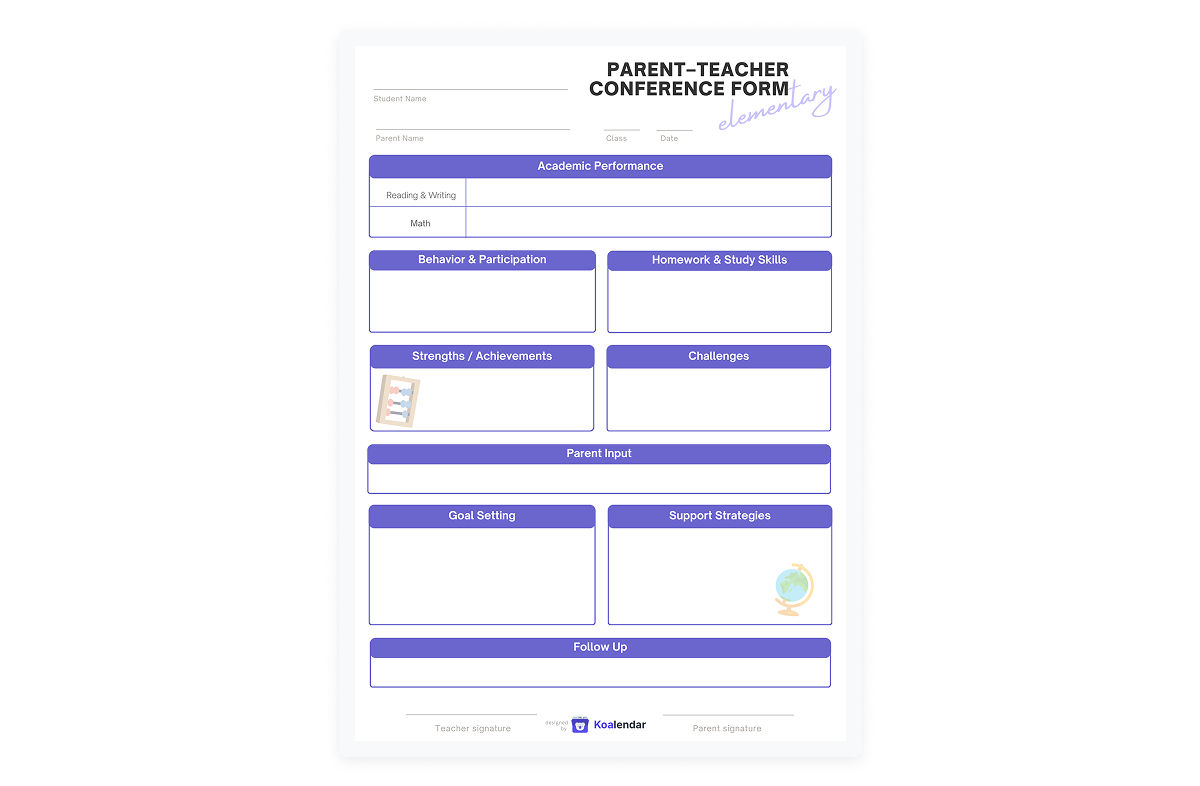
Middle and High school parent-teacher conference form
By middle and high school, conferences shift to a future-focused approach. Parents want to know about grades, study habits, and readiness for the next stage, whether that’s high school, college, or career. Students themselves often take a more active role, making structure even more important.
Student name:
Grade/Teacher:
Date:
Attendees:
| Prompts | Evidence / Notes | |
| Overall Academic Progress | Current grades, trends | Report card |
| Per Subject Highlights | Strengths / concerns in each subject | Bullets |
| Study Skills & Time Management | Deadlines, workload habits | Planner use |
| Attendance & Punctuality | Absence/late data | % and notes |
| Social & Engagement | Participation, discipline, relationships | Observations |
| Extracurriculars & Interests | Clubs, sports, activities | Involvement notes |
| Strengths | Achievements to celebrate | Leadership, awards |
| Challenges | Struggles to address | Concept gaps, distractions |
| Goals / Action Plan | 2–4 clear goals | Academic & personal |
| Parent / Student Input | Questions, reflections | Lines |
| Support & Strategies | Teacher suggestions + parental support | Checklist |
| Follow-Up Plan | Review milestone | Date |
| Signatures | Teacher ___ Parent ___ Student ___ |
Our Middle and High School parent-teacher conference template covers the key areas of this stage. From academic performance by subject, to study skills, attendance, and extracurricular involvement. It emphasizes goal-setting and accountability and leaves space for student reflections. The form aims at helping families and teachers to align on both short-term strategies (like improving homework routines) and long-term goals (like college preparation).
Download the middle school parent-teacher conference form printable
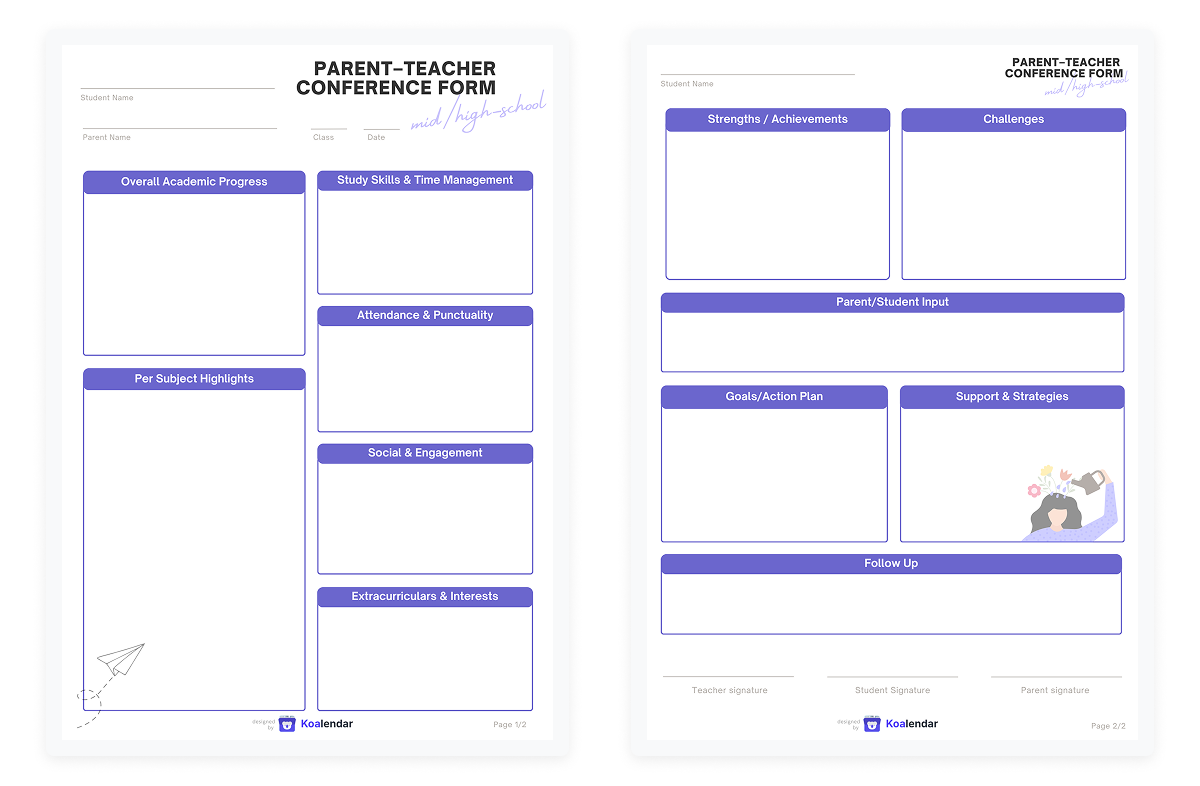
Do you want to create your own parent conference forms for teachers using Google Forms? Check out our video below and learn how to create a Google Form for parent-teacher conferences.
How to use parent and teacher conference forms effectively
A form is only as powerful as how you use it so make sure you’ve got clear objectives for your meeting and plan accordingly. Below we’ve put together an example of a full cycle to help you make the most of your parent-teacher conference form:
Before the conference:
- Send parents a copy of the blank form or a short pre-conference questionnaire so they can share their questions and concerns in advance
- Review the student’s data and fill in your notes under each section of the form
- Decide on 2–3 key goals or discussion points to prioritize
During the conference:
- Use the form as your agenda, walk through it step by step
- Take quick notes as parents share their insights
- Involve the student (especially in middle and high school) by letting them fill out the “student input” section
After the conference:
- Share a completed copy of the form with parents so they have a record of what was discussed and the agreed action plan
- Keep a copy for your files (digital or printed) for reference during follow-up
- For multi-teacher settings (middle/high school), share key notes with subject teachers or advisors so everyone is on the same page
- Revisit the agreed goals at the next checkpoint
Pro Tip: With Koalendar, you can automate some of these steps: send pre-conference questionnaires, automatically email parents reminders with the form attached, and keep the process seamless.
How to prepare for a parent-teacher conference: Step-by-step agenda
A form alone isn’t enough and if parents don’t show up, it’ll be of no use at all. Here’s a quick overview of a step-by-step process to set you up for success:
- Set the agenda – Decide the 3–5 key points to cover. Use the form as a guide.
- Schedule meetings efficiently – Avoid endless emails by using Koalendar’s free scheduling software for schools. Share one link, let parents pick times that work, and get automatic reminders.
- Gather evidence – Bring student work, test scores, and notes.
- Send pre-conference forms – Let parents share concerns in advance.
- Prepare handouts – Provide a summary sheet with takeaways.
With Koalendar, you can also embed your booking page on your school site or email it directly, so every parent has equal access. No more double-bookings or forgotten appointments.
For additional tips and best practices, check out our parent-teacher conferences article.
How a parent-teacher conference form + Koalendar can help
You’ve got your objectives clear, you have created your conference form, and you have shared it with the parents. Now, let’s connect the dots and see how Koalendar can be key to the success of your parent-teacher meeting:
- The form ensures structured, meaningful conversations
- Koalendar for education ensures every parent actually shows up on time, without scheduling chaos
Here’s how teachers save time:
- Automatic reminders reduce no-shows
- Calendar sync prevents overlap
- Unlimited appointments (even on the free plan) means you can run group conferences or individual ones without worry
Imagine this: It’s conference week. Instead of juggling sticky notes and back-and-forth emails, you simply share a link. Parents book themselves, reminders go out automatically, and you walk into each meeting with a clear form in hand.
That’s stress-free teaching.
Conclusion
A parent-teacher conference form isn’t just paperwork; it’s a tool for better conversations, stronger parent relationships, and more focused student support. Remember, you don’t need to overcomplicate it. Using a simple form and Koalendar’s free scheduling software for schools, you’ll get the best of both worlds: structured meetings and effortless scheduling.
So, whether you’re teaching preschoolers or prepping high schoolers for college, the right parent-teacher conference template and scheduling system make all the difference.
👉 Ready to make your next conference week stress-free? Try Koalendar today—free, with no card required.
